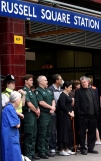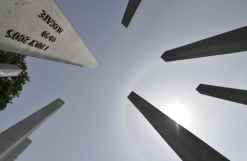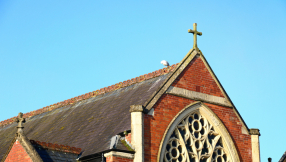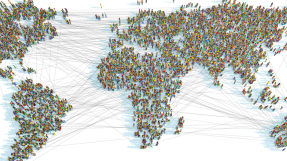The Bishop of London warned this morning of the limits of tolerance and respect alone to defeat the "satanic" terrorism that murdered and maimed hundreds of people in the London bombings ten years ago today.
"We cannot exorcise the satanic by creating a spiritual vacuum," said Dr Richard Chartres in sermon at St Paul's Cathedral at the service marking the tenth anniversary of the July 7 bombings in 2005.
In the coordinated attacks, the day after London celebrated winning its bid to host the 2012 Olympics, 52 people were murdered and more than 770 were injured when four Islamists suicide bombed three London Underground trains and a double decker bus.
Before the service, which was broadcast live, half-muffled bells were rung. They pealed out unmuffled after the service. As the choir sang an anthem to how the souls of the righteous are "in peace", candles representing the site of each incident were placed under the dome and before the altar by PC Hayley Marcham of the City of London Police, Dr Peter Holden of the British Medical Association, PC Gary Sims of the British Transport Police and George Psaradakis of Transport for London.
Those present included the Duke of York, the Prime Minister David Cameron, Mayor of London Boris Johnson, Home Secretary Theresa May, US Ambassador Matthew Barzun, former mayor Ken Livingstone and former prime minister Tony Blair with his wife Cherie.
Bishop Chartres described London as a "laboratory" for testing whether it will be possible for cosmopolitan civilisation to hold together. "We are in the midst of debate about identity including what it means to be British."
Some in the world were reacting to change by retreating into ever narrower definitions of their identity, he said. "Merely invoking the universal concepts of tolerance and respect with which we probably all agree does not generate one iota of the energy required to transform lives and build a community."
It was not possible to exorcise the satanic by creating a spiritual vacuum, he said. "Sometimes tragically we manufacture a god in our own image, an idol created when a bruised and humiliated ego surreptitiously re-ascends by projecting its own rage and lust for power."
While he conceded that social and economic factors had a role in incubating religious extremism, the religious element cannot simply be reduced to "something else". Chartres said: "It is part of being human to worship and if there is no worthy object of worship then the vacuum is filled by something banal or lethal."
He described how most of the victims were young and came from all over the UK and all over the world. They included Jews, Muslims, Christians, Hindus, Buddhists and Humanists. He spoke of how the book of tributes that was compiled after the attack conveys a unifying agonised outcry: "This was a terrible crime which robbed us of beloved sons and daughters, partners and friends."
He remembered the day as one of confusion, then confirmation of the dreadful truth, and then all through the day stories of the courage and humanity of the emergency services.
"The London Underground Staff were first on the scene in the smoke filled tunnels comforting the dying at a time when no one knew whether there was a possibility of other bombs," he said. "All through the day police, fire, ambulance crews worked past exhaustion point to bring relief to the injured and very soon to the bereaved."
He also spoke of the spontaneous outpourings of grief. "There could have been so easily demonstrations of anger but beyond the numbing shock there was solidarity. London had been attacked and there was unity in our grieving."
And he paid tribute to the thousands of survivors who, years after the event, sometimes relive the nightmare in their dreams. "As our hearts go out to the families and friends of the victims of terrorism, especially those murdered so recently in Tunisia, we must learn that care for survivors is a responsibility both in the immediate aftermath of such a tragedy and for years to come."
Half way through the service, the names of all 52 who died were read out to the congregation before everyone at St Paul's joined the nation in observing a minute's silence. Brightly-coloured motes of lighted dust drifted down from Sir Christopher Wren's dome onto the bowed heads of those stood in prayer.
In the bidding prayer the Dean, Dr David Ison described 7/7 as "a moment in time when lives were destroyed and the world was changed."
He said: "We come together to share our grief and to comfort one another, to find strength and to foster resilience, and to affirm that, even in our darkest hour, the light of faith and the flame of hope burn strong."
He prayed that "those who wish us harm would turn away from hatred and follow the path of peace."
Canon Tricia Hillas of St Paul's read from Isaiah 51: "You fear continually all day long because of the fury of the oppressor, who is bent on destruction. But where is the fury of the oppressor? The oppressed shall speedily be released, they shall not die and go down to the pit, nor shall they lack bread."
Boris Johnson read from Philippians: "Keep on doing the things that you have learned and received and heard and seen in me, and the God of peace will be with you."
Besides representatives of the families of the dead and injured, there were faith leaders including Dr Shuja Shafi, secretary general of the Muslim Council of Britain, Rabbi Laura Janner-Klausner of the Reform movement, Vivian Wineman of the Board of Deputies of British Jews, Lord Singh of the Network of Sikh Organisations, Malcolm Deboo of the Zoroastrian Centre and Alpa Kothari of the Jain Network.















